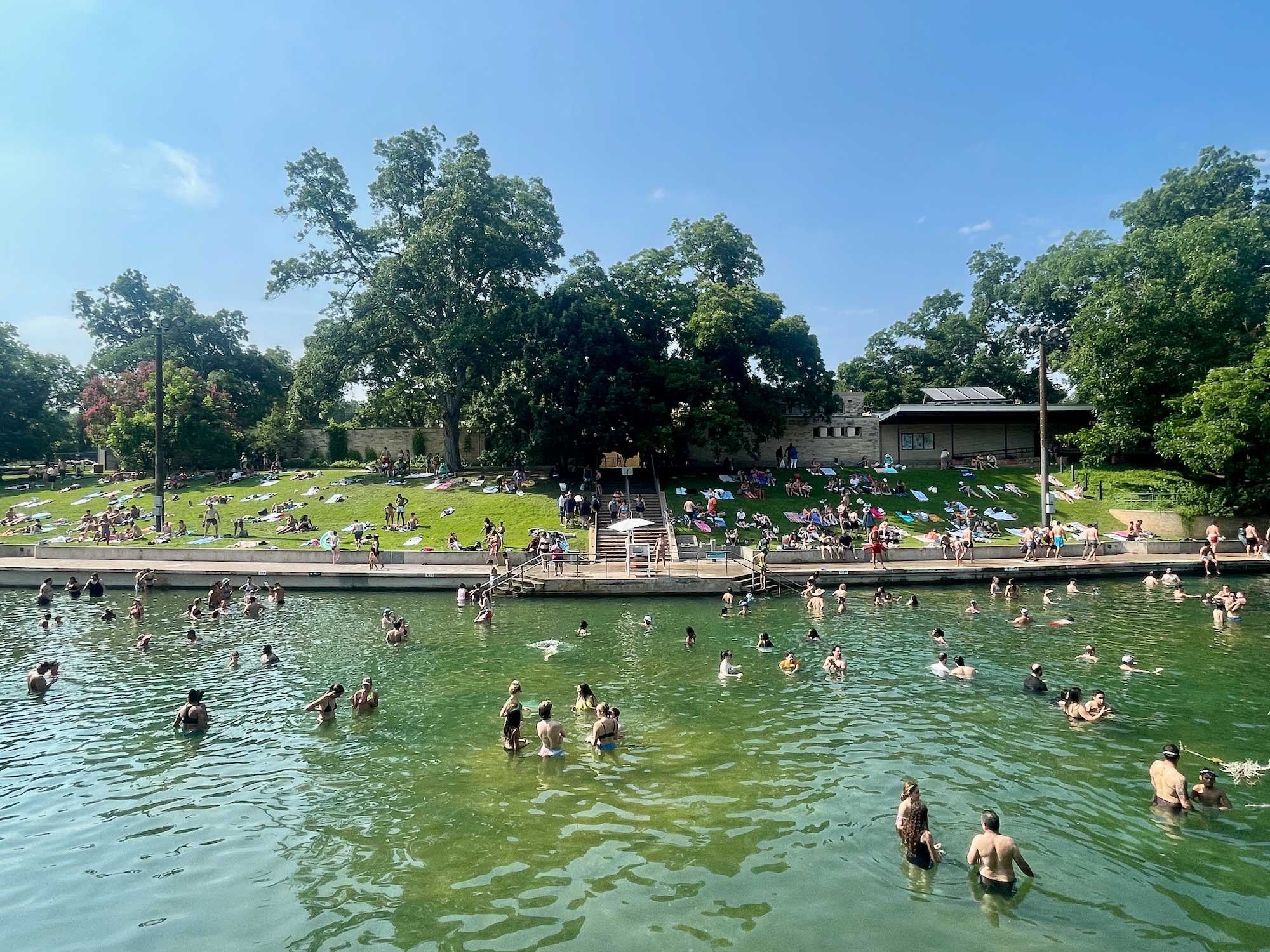pool petition
Austinite floats petition to ban aerosol sunscreen at Barton Springs

A local wants to ban aerosol sunscreens, but a Parks and Rec supervisor says it's unlikely.
Update: Readers have suggested one of the links shared in this article is not from a reliable source. CultureMap cannot prove whether or not this source was reliable, but since the information did not address a specific claim in the petition, the entire reference was removed.
--
On any given summer day, you can expect to find Barton Springs Pool crowded with people trying to keep cool. The grassy hill will be dotted with sunbathers and shade-seekers; the water will be full of lap-swimmers, floaty-sitters, and diving board-jumpers. All around you’ll hear a low hum of conversation, bursts of laughter, music from the free side drifting languidly over, and more often than not, the distinct sound of spray sunscreen being applied.
To most people this last one is easily ignored, or simply blends right into the background noise. But for many Barton Springs regulars, the consistent sound (and smell) of spray sunscreen points to a much bigger problem — so much so that one Austin native, Melissa Barber, has set up a petition to ban aerosol sunscreen at the Springs.
“I was at Barton Springs with my baby, who was about six months old, and we were sitting on the hill and the air just all of the sudden became full of aerosol sunscreen. You could taste it, smell it, see it on the water, and I got frustrated and started researching — What’s in these aerosol sunscreens that my baby is breathing in? The more I started looking into it, the worse it got,” she says.
Additionally, some spray sunscreens contain something called titanium dioxide, which is what gives mineral sunscreens a white, rather than clear, appearance. When sprayed, tiny titanium dioxide particles can be inhaled, which research shows can lead to lung problems and increase the risk of cancer. This is why California recently updated a proposition warning against airborne titanium dioxide. (It’s important to note, it seems to be a safe ingredient when it is not airborne.)
“They ban smoking in public places. How is it fair to allow people to spray worse [stuff] into the air for everyone to breathe? I’d rather smoke a cigarette and catch a nicotine buzz than sit there inhaling carcinogenic aerosol products with absolutely no payoff,” says Barton Springs regular Kevin McAfee.
Aside from being harmful to humans, Barber points out the negative impact these aerosols may have on the environment. From the petition page: “Aerosol sunscreens contain harmful chemicals such as oxybenzone and octinoxate that can seep into water bodies and harm aquatic life.” This is true of some cream sunscreens, as well.
Additionally, spray sunscreens often contain volatile organic compounds (VOCs), which studies show contribute to ozone depletion and climate change, as well as an increased risk of cancer.
But could these potential risks be worth it, if we’re protecting ourselves from harmful U.V. rays?
The answer to that is “yes,” if you ask DeAndre Cain, the Aquatic Supervisor for the City of Austin’s Parks and Recreation Aquatics Division.
“The impact of banning aerosol — or any type of sunscreen at all — would lessen the likelihood of somebody using it. And we want people to use sunscreen. The harder you make it for people to protect themselves, the more likely it is that somebody down the line is going to have issues.”
Instead, Cain emphasizes the importance of educating people on how to apply sunscreen.
“Any time you apply sunscreen, whether it be aerosol or anything else, it has to sit on your skin for 15 to 20 minutes to absorb and actually protect you… So whenever you don’t apply it correctly and let it sink into your skin, some of it is going to come off… And it will float at the very top of the water.” He adds that because the sunscreen floats at the top of the water, it’s not an environmental issue for the animals and plants that primarily live at the bottom of the Springs.
He sums it up with, “We have no interest, really, in banning aerosol sunscreens.”
This is where Barber hopes her hard work will pay off. Currently her petition is circulating online with more than 1,300 signatures, but according to Barber, this is just the beginning.
“For a petition to get us where we need to be, we’d need tens of thousands of signatures. So right now, the petition is mostly a way to spread the word. Kind of like a public service announcement.”
In addition to the petition, she has teamed up with an ecotoxicologist researcher who was recently instrumental in Hawaii’s legislation banning chemical sunscreens in 2021. They have now started an independent research study at the Springs, sampling the water and fish there, to see what environmental impact these chemical sunscreens are having — aerosol and otherwise.
“The [environmental] problem is bigger and includes all chemical sunscreens,” Barber says, “but if we just start with aerosols, which are just so incredibly ineffective and bad for the environment, then I think it’s a good place to start.”
When Barber says aerosol sunscreens are ineffective, she’s pointing to recent research that shows an increased risk of skin cancer when using spray sunscreens, compared to lotion sunscreens. In a press release, Australia’s Cancer Council said, “It is extremely difficult to get good levels of U.V. protection from these products.”
Melissa Barber’s active petition can be found at change.org.
